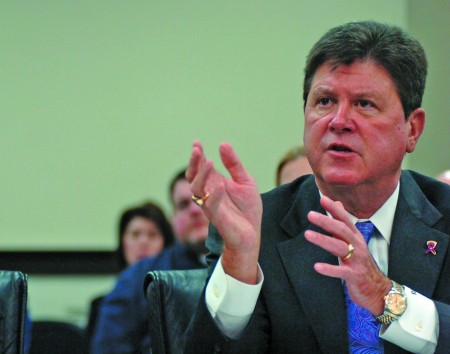
House Speaker Greg Stumbo (D-Prestonsburg, Ky.) is prolonging the Frankfort fight to make the University of Pikeville a state institution.
The Democrat state Senate leader told reporters Monday he will not support any extra higher education funding until the Appalachian private college is adopted into the state school system.
“You know if they want my support in helping do whatever to get some more money into higher education then somebody better be figuring out what to do with that situation up there,” he told The Associated Press this week.
Stumbo’s comments come almost a year after he and Pikeville President and former Gov. Paul Patton pushed controversial legislation calling for the private college’s institutional adoption at the cost of losing students served by Eastern Kentucky and Morehead state universities.
The legislation would have voided more than 10 Kentucky counties from standing state universities’ service regions. Controversy came early this year when several Kentucky state universities – Murray State among them – spoke out against the bill. Officials argued it would unnecessarily deplete eastern Kentucky enrollment and come at the cost of students statewide.
The University of Pikeville serves slightly less than 2,000 students from 81 counties in the state, 39 states and 12 countries. The private college in Pike County was always a hot topic for the experienced state legislator; Stumbo was the No. 1 backer of last year’s legislation that was shot down after the new year.
When the bill was met with so much criticism last year, Patton abandoned his support for the bill in favor for a scholarship alternative Gov. Steve Beshear signed into law for July 1 of this year. The compromise allocates slightly more than $2 million in coal severance tax receipts for a pilot scholarship program in the region around the Pikeville main campus. The scholarships benefit students attending Pikeville or nearby Alice Lloyd College.
Now, however, Stumbo said he stands strong behind what he calls the only logical choice for the impoverished and undereducated Appalachian region of eastern Kentucky. He told the AP he was willing to explore other options for the school, but his personal preference was always allowing Pikeville to go public.
Stumbo has been in contact with Patton, who said the scholarship program has been very beneficial for attracting students to the region, but more can always be done.
He said students choosing not to go to college because there are no reasonably priced choices nearby is a sign of failed government policy.
Beshear called for a study on the feasibility of a public Pikeville university last December, which found that the maximum capacity of the private college could only account for 2,000 of the nearly 7,000 students the region needs to educate each year. Additionally, the report found that Pikeville’s current recruitment drew the majority of students from Pike, Floyd or Letcher counties and would have a limited affect should it service a 16-county region.
Educational services are still needed in the region, however. In 2007, the U.S. Census Bureau determined 20 percent of the poorest counties in the nation are located in eastern Kentucky, and in 2011, only 18 percent of 24 to 64 year olds in the region had four-year degrees, compared to the 30 percent state average.
The Kentucky Council on Post Secondary Education – responsible for equal and fair education in the state – has stayed largely impartial during the debate over a public University of Pikeville, but Sue Patrick, a spokesperson for the council told the AP the higher education body looked forward to working with Stumbo to find a solution.
Story by Austin Ramsey, Editor-in-Chief.